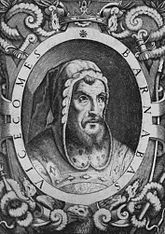Bernabò Visconti
| Bernabò Visconti | |
|---|---|
| Lord of Milan | |
 |
|
| Coat of arms |  |
| Reign | 1349 - 1385 |
| Predecessor | Giovanni Visconti (archbishop of Milan) |
| Successor | Gian Galeazzo Visconti |
| Issue | |
| Noble family | House of Visconti |
| Father | Stefano Visconti |
| Mother | Valentina Doria |
| Born | 1323 |
| Died | 19 December 1385 |
Bernabò or Barnabò Visconti (1323 – 19 December 1385) was an Italian soldier and statesman, who was Lord of Milan.
He was born in Milan, the son of Stefano Visconti and Valentina Doria. From 1346 to 1349 he lived in exile, until he was called back by his uncle Giovanni Visconti. On 27 September 1350 Bernabò married Beatrice Regina della Scala, daughter of Mastino II, Lord of Verona and Taddea da Carrara, and forged both a political and cultural alliance between the two cities. His intrigues and ambitions kept him at war almost continuously with Pope Urban V, the Florentines, Venice and Savoy. In 1354, at the death of Giovanni, he inherited the power of Milan, together with his brothers Matteo and Galeazzo. Bernabò received the eastern lands (Bergamo, Brescia, Cremona and Crema), that bordered the Veronese territories. Milan itself was to be ruled in turn by the three brothers. The vicious Matteo was murdered in 1355 at the order of his brothers, who divided his inheritance between them.
In 1356, after having offended the emperor, he pushed back a first attack upon Milan by the imperial vicar Markward von Randeck, imprisoning him. In 1360 he was declared heretic by Innocent VI at Avignon and condemned by Emperor Charles IV. The ensuing conflict ended with a dismaying defeat at San Ruffillo against the imperial troops under Galeotto I Malatesta (29 July 1361). In 1362, after the death of his sister's husband, Ugolino Gonzaga, caused him to attack also Mantua. Warring on several different fronts, in December of that year he sued for peace with the new pope, Urban V, through the mediation of King John II of France. However, having Barnabò neglected to return the papal city of Bologna and to present himself at Avignon, on 4 March 1363 he was excommunicated once more, together with his children, one of whom, Ambrogio, was captured by the Papal commander Gil de Albornoz. With the peace signed on 13 March 1364, Visconti left the occupied Papal lands, in exchange for the raising of the ban upon a payment of 500,000 florins.
...
Wikipedia
